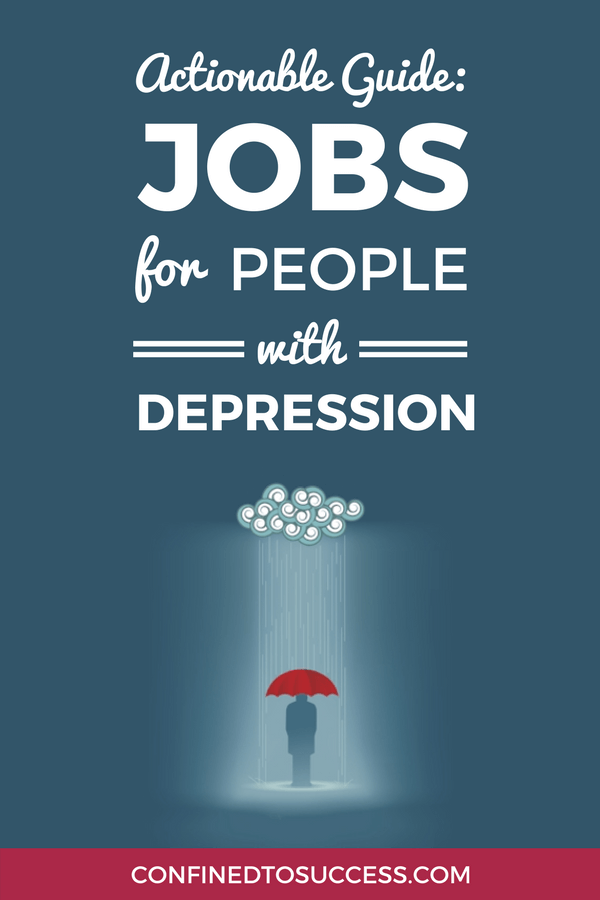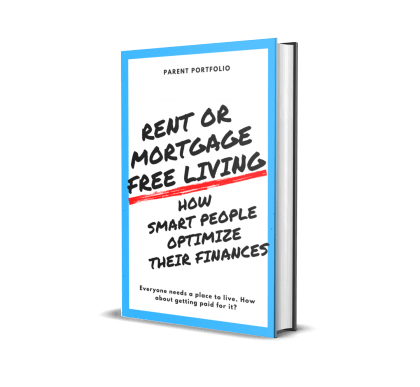Best Jobs For People With Depression (Tips & Strategies)

Have you begun to feel like work is the last place you want to go? Are you so stressed out that you no longer know where to start when you wake up? If so, you might be suffering from depression.
The mental and physical toll depression has on you can make finding a job or managing a current one overwhelming as it can leave you feeling mentally, emotionally, and physically drained at the end of the day.
The process, however, doesn’t need to be so difficult when you learn to break it down into something more manageable. In doing so, you might conclude that your current job isn’t such a good fit, or you might realize that your experience at work could improve simply by putting a few self-care strategies into play.
Let’s look at this together, starting with the basics…
WHAT IS DEPRESSION?
We all have days when all we want to do is go back to bed and have a do-over. But depression goes beyond simply having the blues. When certain symptoms linger for two weeks or more and/or keep us from being productive, a more serious condition might be the cause: major depressive disorder, also known as clinical depression. [source]
Some symptoms of clinical depression to watch out for include:
- Loss of interest in activities you used to enjoy
- Feelings of hopelessness or sadness
- Unusual bouts of anger or irritability
- Appetite changes that increase or decrease your weight
- Sleep problems, such as insomnia or sleeping too long
- Forgetfulness or difficulty concentrating
- Fatigue, headaches, or back pain
In most cases, symptoms of clinical depression interfere with your life in some capacity. Whether it’s at home or work, you might begin to notice changes in how you manage or respond to stress and responsibilities.
Sometimes you won’t even notice these changes yourself but family members or co-workers might (depression ranks as a top concern in the workplace). [source] Either way, make sure to seek out professional help if you suspect clinical depression as the cause of your symptoms. Working together with a healthcare provider on a treatment plan could help you feel ready to manage work-related and daily life tasks again.
Let’s now turn to jobs for people with depression, starting with what you shouldn’t do…
WORK CONDITIONS TO AVOID IF YOU HAVE DEPRESSION
High-Stress Jobs
Fast-paced, highly-stressful occupations aren’t advised for people with depression, even if they look good on paper. For example, while social workers make important contributions to society, many encounter countless situations involving child abuse, spousal abuse, or other disheartening circumstances when helping clients — all situations that can exacerbate depression or even cause it. [source 1 | source 2]
Similarly, professionals in the healthcare field might also witness unsettling and saddening cases with patients on a daily basis, just in a different way. Being regularly exposed to sad situations like these could make it hard for you to focus on your own well-being. Recognizing this in yourself is perfectly okay.
Since stress tends to increase feelings of hopelessness in many depression sufferers, it’s better to recognize this early on in your career choice rather than get stuck in a job where you might have to endure these kinds of pressures day after day.
Low-Stress Jobs
On the other end of the spectrum, jobs where you might not feel stimulated enough, such as data entry, can cause you to feel frustrated and irritable, which can also lead to depression. [source] And boring tasks like these can be made worse when your work schedule doesn’t allow for enough breaks.
At this point, you probably know where I’m going with this… it’s all about finding a job that offers the right balance. What are those jobs? Well, I’ve listed a few below, which we’ll get to in a moment.
Difficult Employers
Another common problem at work could be a demanding and/or intimidating supervisor who’s not approachable to his/her employees. How are you supposed to express your concerns and requests when your boss lacks an empathetic ear? There’s only so much a person can take and recognizing your limits is an important part of personal happiness.
Unfortunately, screening out difficult employers is more of a challenge than eliminating high-stress or low-stress jobs since you don’t know what you’re getting yourself into until you actually start the job. That said, there are a few red flags you can watch out for early on: [source]
- The company has a questionable reputation (a simple Google search may help in this regard).
- Disrespectful communication over email or during the job interview.
- They seem desperate to hire you (bad work conditions may have turned the company into a revolving door).
TIPS TO HELP PREPARE FOR THE WORK DAY
As mentioned, the workplace environment can have a big impact on your mental health, including increasing symptoms of depression. Thus, you want to make sure to safeguard yourself from doing anything that might worsen your condition. To this end, there are a couple things you want to make sure you’re doing:
Have a support team – Work-related responsibilities can be a source of anxiety and as depression and anxiety are often interlinked, this shouldn’t be overlooked. [source] One way to reduce some of this angst is by making sure you have someone in your life who will always have your back, especially when it’s so easy to feel overwhelmed by life’s daily demands. Establishing support, however, takes time and you might need to have several candid conversations before earning people’s trust, whether it’s a co-worker, friend, or family member.
Use self-care techniques – Any tactic that allows you time to regroup and regain your composure can only help. Perhaps your idea of fun is spending Friday nights in a bubble bath with a good book. Or maybe setting the alarm clock an hour early to have a quiet cup of coffee in the morning before work sounds appealing. Whatever it is that comforts you and provides some time for you to commune with yourself is strongly encouraged!
TIPS TO HELP GET THROUGH THE WORK DAY
While preparation is helpful, it’s not the same as having to endure the work day itself, right? Thus, it’s good to have some tips at your disposal when you need extra support because let’s face it, many of us spend a lot of time at the workplace every week:
First, don’t suffer in silence, make an effort to talk to your employer (assuming he/she is open to listening). [source] While the stigma often associated with mental health problems may make you want to keep your condition under wraps, disclosing your illness may actually improve your situation in the long run. And remember, there are now equal opportunity laws that protect you from being fired or discriminated against, so you shouldn’t be worried. [source]
You never know, your employer might be able to find ways to make your workday more tolerable and avoid certain symptoms from worsening:
- If your workload feels overwhelming, ask whether it’s possible to delegate out some tasks so you’re better able to handle the rest of the work (or ask for more time to complete a project).
- If you have a hard time always being around co-workers or if you have difficulty concentrating due to office noise, try to negotiate a quieter workspace. [source]
- If you need to take periodic breaks to recoup or to see a healthcare professional on a regular basis, ask about the possibility of telecommuting instead.
Besides having a heart to heart with your employer, here are some other simple ways that may help ease your workday:
- checkUse your entire lunch hour to recharge your batteries – Yup, that means no more skipping lunch or cutting it short to resume work. You can also use this time for creative pursuits like drawing, which are known to stave off depression. [source]
- checkBreak up long stretches of tedious or sedentary work – Interrupting long sessions of work to stretch or walk can help you feel refreshed and encourage the production of endorphins, which can elevate mood.
- checkReduce office noise – If a loud workspace distracts or creates anxiety for you, consider playing relaxing music or wear earbuds to block out the disruptive sounds.
- checkMeditate or perform other calming exercises – Breathing or quietly thinking about a place that brings you peace could temporary halt stressful activities throughout the workday.
- checkConsider getting a therapy animal – Cats and dogs may induce feelings of tranquility but there are usually not allowed in the workplace. Colorful fish, however, might be an option.
IDEAL JOBS FOR PEOPLE WITH DEPRESSION
Now that you know the types of work conditions to avoid when suffering from depression AND how best to manage your workday given your limitations, which jobs should you actually aim for? Well, you want to start with your strengths and weaknesses. Do you have interests and/or experience in fields that force you to use your brain that aren’t too stressful? Some careers that might fall under this category include:
- Actuary
- Audiology
- Computer programming
- Dog training
- Floristry
- Gardening
- Librarianship
- Optometry
- Technical writing
- Truck driving
Or perhaps a home-based job could meet your financial obligations while keeping your personal environment quieter and a little more flexible. Some jobs that might offer this change of pace are:
- Graphic Design
- Social Media Manager
- Medical transcription
- Online tutoring
- Translating
Some other good job possibilities (with dedicated how-to guides) include:
Ultimately, the best jobs for people with depression allow you to lead a productive life while maintaining control over your work environment and schedule. Many work from home jobs offer just that. Think about it, you’d be able to incorporate relaxation techniques into your workday and avoid the crowded office environment where demanding coworkers can often make you feel worse.
With persistence and determination, it’s possible to make a living from home with any of the jobs listed above!
NOW IT’S YOUR TURN!
What jobs for people with depression would you recommend? How have you dealt with depression in the workplace in the past? Leave your comments below!








